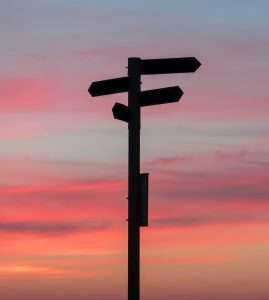What to do when you just can’t figure out the big questions in your life
At some point in our lives, we all face important and daunting questions:
- What career should I choose?
- Should I change careers? I’m bored and I think I’d like field xyz….
- Should I move to this exciting new city I’ve been dreaming about forever?
- I have this great business idea. Should I go for it?
- How can create passive income and not get stuck in the daily grind?
- What am I going to do when I’m retired? I can’t sit around all day.
- What is my greater purpose in life?
… and so on.
These are tough questions and many of us don’t have all the answers. A number of authors and “experts” have put forth a multitude of ways to “find your way and purpose”. After some brainstorming, mind maps, and soul searching, you’re supposed to head off to the newly found true north of your life. If you put all your efforts into it and put the right energy out into the universe, things will happen for you and you will – step by step – make it to your goal, … eventually. Happy ending – story closed.
But if you’re like me, this may not work for you. There are too many options, too many unknowns to even pick your destination. If you’ve never been there, never lived through what you’re hoping to experience, how do you even know it’s right for you? How do I know if I’ll like sailing around the world in a yacht visiting tropical locations with money to spend if I currently barely have enough in the bank to spend a long weekend at the local beach? Should I just have faith and hope that – with the right amount of effort, focus, and tenacity – things will fall into place and the universe will help get me there?
At one point I was told I had “too many irons” in the fire and that I should rather focus on “the one thing”. That advice rubbed me the wrong way, but I couldn’t put my finger on it at the time. I think I know why now….

What if we took a different approach? We have an important question. We have ideas and theories about it and we know where we are today, i.e. our starting point. What if, instead of embarking on the one journey towards the idealistic end state which we really know nothing about, we acknowledge that we don’t know enough, but we can find out. Instead of knowing our one destination, we may have several potential ideas and solutions. From the present, our starting point, there are many possible futures for us. How can we form hypotheses around those and then validate (or disprove) them?
Some examples:
I think I’ll love living in New York City. – Do you know anybody there that you can talk to about what life is really like? Can you go on a trip there and instead of staying in a hotel downtown, rent a small apartment for few weeks and see what living there might really be like, with commuting into town, buying and cooking your own food, and hanging with the locals? Can you apply for jobs there to see what responses you might get?
I want to change jobs and become a project manager! – Can you network and talk to current project managers about the good, the bad, and the ugly? What do job satisfaction surveys say? Can you take time off from your current job and do a short stint as a project management intern? Can you manage projects pro bono in your spare time for a non-profit or try your luck on Upwork in addition to your 9-to-5 job?
I want to start a business offering a product to a specific segment of customers! – Instead of building, marketing and selling the product, which can take months and lots of money, can you run lean experiments to validate that the problem you’re trying to solve actually exists? Can you just set up a web site to measure what type of interest you get, what messaging resonates, and what customers are willing to pay for your product or service? Can you get valuable feedback based on mock-ups or lightweight prototypes?
You get the idea. It’s about hypotheses and experiments. You learn a little bit each time and then map out the next step, the next experiment. Or you “pivot” and adjust. Or you abandon the idea. It’s all about incrementally learning and validating, every step of the way. If you fail and you have to abandon a path, don’t be frustrated; instead, think about how much time, effort, and money you probably saved by eliminating a course that wouldn’t get you anywhere. You put an early end to a possible future that would not have worked for you.

This brings me back to “irons in the fire”. What I was – and am – doing is running my own “lab“, my own ”test kitchen”. Think of this as placing many small bets. Some will work out and succeed, opening up a path for more bets and deeper exploration. Other will blow up and turn out to be duds, but result in valuable learnings. You won’t know if you’ll enjoy something, if an idea is feasible, or if a business has potential up front, until you run experiments and find out. It’s quite possible, even efficient, to run several, maybe many, of these small experiments concurrently, also because there will be wait times involved. You’re placing many small bets at the same time, planting many small seeds to see which – with proper watering and time – will turn into a plant. Some grow (or die) quickly, many require more time.
In the end, I believe that hardly any of us “know their way” up front. At best we may know the general direction. I many cases, we have several “wild ideas” that could lead us down very different potential paths. Instead of getting frustrated with our lack of clearly knowing what we should do, let’s experiment and find out. As some of our successful experiments string together, a viable path will hopefully emerge and gain momentum.
Let’s call it “life by experiment”. It won’t be easy or linear, but it will probably be fun!
